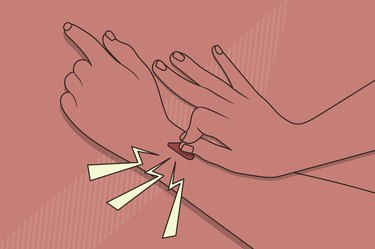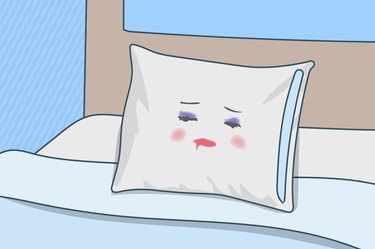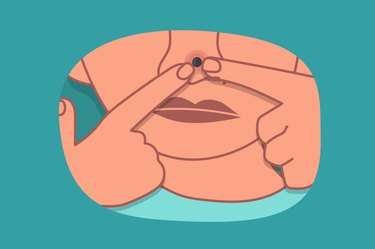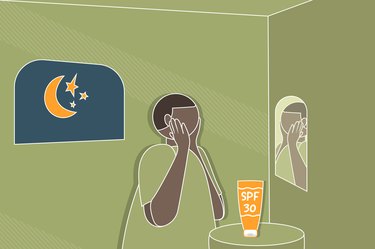
Should you pick a scab? We all know the answer is no. And yet...keeping your hands off those crusty, scaly bits can be surprisingly difficult. (Sort of like not popping a pimple.)
So what's the worst that can happen if you succumb to the urge to scratch or pick?
Video of the Day
"Scabs are tempting to pick, as some people get satisfaction or gratification from picking. Some people may also do it as part of dealing with anxiety, stress or boredom," explains Marisa Garshick, MD, assistant clinical professor of dermatology at Cornell–New York Presbyterian Medical Center.
There's also the fact that scabs have a tendency to get dry, itchy or tight, which can make picking even more tempting.
The problem? While picking scabs feels good in the moment, you're only setting yourself up for problems down the road.
"I always advise people that picking scabs can make them worse, so it's always best to let them heal rather than to pick," Dr. Garshick says.
What Is a Scab, Exactly?
Scabs are the body's DIY bandages. After skin sustains a wound, the body forms a hard, dry crust over the outside to keep the area clean while fresh skin forms underneath.
"They form a protective barrier to guard a wound from bacteria and dirt," says Dr. Garshick.
Scabs are temporary. Once the skin underneath has finished repairing, the crust will fall off on its own — usually within a week or two, according to the Nemours Foundation.
In other words, you're not supposed to pick off a scab, and there's really no need to do it.
The Effects of Picking Scabs
So what exactly happens if you pull off a scab before it's ready to fall off naturally? Here are three pretty likely scenarios:
1. The Wound Will Take Longer to Heal
Picking a scab usually causes the wound to bleed again. That's because when you pull the scab away, you're also tearing off some of the newly reformed skin that has grown over the wound, per the Nemours Foundation.
When that happens, your body has to go back to the drawing board to regrow even more new skin. As a result, it ends up taking longer for the wound to heal completely, Dr. Garshick explains.
2. It Can Make Scars Worse
Some minor wounds don't develop scars. But if you're on track to get one, picking at a scab will only make the mark more noticeable. (Unfortunately, applying antioxidant oils probably won't make a difference.)
"Picking causes more injury to the skin," Dr. Garshick says.
And the worse the injury, the more likely you are to end up with a scar.
3. You Could Get an Infection
Open wounds are at higher risk for becoming colonized by harmful bacteria. That can up the odds that a no-big-deal wound ends up becoming infected, says Dr. Garshick.
That can set the stage for complications. Cellulitis, a bacterial infection that often stems from open wounds, requires treatment with antibiotics and could lead to infections of the blood, joints, bones or heart, according to the Centers for Disease Control and Prevention.
What to Do Instead
If you can leave your scab alone, do so. But if it's itchy or uncomfortable and generally driving you crazy, try applying a light coat of petroleum jelly, recommends Dr. Garshick.
"Carry a pocket-sized tube or jar and apply the ointment each time you're tempted to pick at the area," she says. "It'll prevent you from picking while also providing a protective barrier to help with wound healing."
Try Vaseline Original Petroleum Jelly ($4.29 for 2-pack, Amazon).
If that's not enough, you can take the extra step of covering the wound with a bandage. (You can also fill up on foods that support wound healing while you're at it.)
If you repeatedly pick at scabs and can't stop yourself, you may have dermatillomania, a compulsive disorder characterized by automatic or compulsive skin-picking. While some people with dermatillomania will pick at healthy skin, others tend to focus on scabs, pimples or dry patches, according to the Cleveland Clinic.
Dermatillomania is considered a psychiatric condition, not a dermatological one, so it should be treated by a mental health professional, Dr. Garshick notes. The disorder is typically managed with a combination of medication and therapy.
So, How Bad Is It Really to Pick a Scab?
Picking a scab can cause your wound to heal more slowly or form a more noticeable scar at best. And at worst, it could increase your risk for a nasty infection.
"In general, it's bad," Dr. Garshick says.
So steer clear, apply some ointment and a bandage if needed and let your skin do its thing so your wound can heal.
Was this article helpful?
150 Characters Max
0/150
Thank you for sharing!
Thank you for your feedback!
Is this an emergency? If you are experiencing serious medical symptoms, please see the National Library of Medicine’s list of signs you need emergency medical attention or call 911.



